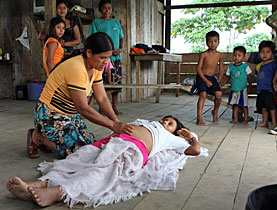Healing through community health care

When the Declaration of Alma-Ata was signed 30 years ago, hopes were high that health care among the world's poor could be revolutionised.
The radical agreement, which took a community-based approach to health, never became universally accepted, although its ideals live on in Switzerland’s work in foreign countries.
Named after the declaration’s birthplace in Soviet Kazakhstan, Alma-Ata was hailed as a pioneering document at the time. It assumed that raising health levels would drive overall development.
“[It] broadened the medical model to include social and economic factors, and acknowledged that activities in many sectors, including civil society organisations, shaped the prospects for improved health,” said Margaret Chan, the Director-General of the World Health Organization (WHO) in a statement to mark the 30th anniversary.
“Fairness in access to care and efficiency in service delivery were overarching goals.”
The accord advocated primary health care (PHC) – where communities took affordable health provision into their own hands, such as running their own clinics.
However, it was not welcomed by everyone, with some calling it an attack on the medical establishment or too utopian.
It was also overtaken by world events, such as a global recession, and by new problems like HIV/Aids. “Vertical” health projects, focused on one disease, became more common.
By 1994, the WHO concluded that the goal of “health for all” by 2000 as declared at Alma-Ata would not be met.
Influences
But as the Swiss Health Cooperation Symposium in Basel heard earlier this month, Alma-Ata was influential for Swiss organisations, even if the country did not sign up to the declaration.
Daniel Mäusezahl, the senior health advisor with the Swiss Agency for Development and Cooperation (SDC), said that the organisation fully supported Alma-Ata in 1978 and had pursued the declaration’s spirit ever since in health and social development.
“The SDC is convinced that change can only be sustainably achieved in making the voice of the poor heard, i.e. empowering communities, civil society and users of health services in the planning, implementation and co-management of health services in both health promotion, prevention and care,” Mäusezahl told swissinfo.
Around 150 health projects in Tanzania supported by the SDC are carried out using the community-based approach.
The Swiss Red Cross (SRC) advocates community-based projects in remote areas, like the Amazon Basin in Ecuador where it has built up a health network.
The SRC’s Verena Wieland said that such projects needed time and flexbility.
“We have to respect the process of the community itself and strengthen local ownership be it in the community, local government or Ministry of Health,” she said.
Success in Eritrea
Projects can be vital. In some areas of Eritrea, villages are up to 15 kilometres away from the nearest health centre.
Authorities there decided to set up a scheme, run by the non-governmental organisation Vision Eritrea and supported by the SDC and SRC, to train local volunteers to act as health workers and childbirth assistants.
“The benefit is that we’ve been able to ensure permanent ownership of communities which gives them the right and the privilege to look after the ways and means of addressing their basic health needs,” Vision Eritrea’s director, Tseggai Gherezghiher, told swissinfo.
“We have also been able to ensure the sustainability of theses programmes. It’s one thing to start a programme, but when you leave it has to continue by itself.”
Preventable disease and death rates have fallen significantly and there are now moves to expand the programme.
Full circle?
As for the WHO, it has been advocating a “return to Alma-Ata”. Its World Health Report 2008 found huge gaps between the rich and poor in health care.
This prompted a call for a reconsideration of primary health care principles to “steer health systems towards better performance”.
For the SRC, the move towards a global debate on this issue is a welcome one. The SDC also remains true to the spirit of Alma-Ata.
“Today’s PHC key principles – access and universal coverage, people-centred services under good leadership and stewardship in a healthy public policy framework – remain part of SDC’s future health and development policy,” said Mäusezahl.
swissinfo, Isobel Leybold-Johnson in Basel
The Swiss Health Cooperation Symposium was organised by Medicus Mundi Switzerland, Network Health for All. It was held on November 11.
The symposium targeted a broad spectrum of participants active at the national or international level including 46 Swiss agencies.
It is part of a long-term cooperation agreement with the SDC, which provides support for the event.
The Declaration of Alma-Ata was signed by International Conference on Primary Health Care at Alma-Ata – now Almaty, the capital of Kazakhstan – in September 1978.
It was the first declaration underlining the importance of primary health care. This approach has since been accepted by many WHO member countries with the goal of health for all.
By the definition given in the conference, primary health care “includes at least: education concerning health problems; guarantee of food supply and proper nutrition; an adequate supply of safe water and basic sanitation; maternal and child health care, including family planning; immunisation against major infectious diseases; prevention and control of locally endemic diseases; appropriate treatment of common diseases and injuries; and provision of essential drugs”.
The conference underlined the importance of social and economic development and political independence they related to successful public health, and emphasised the responsibility governments have for the health of their people.
The World Health Report 2008, “Primary health care, now more than ever”, published on October 14, commemorates the 30th anniversary of Alma-Ata.
It found big differences between richer and poorer countries: life expectancy differences now exceed 40 years, of the 136 million women who will give birth, 58 million will receive now assistance endangering their and their babies’ lives.
Annual government health expenditure per capita around the world varies from $20 (SFr17) to $6,000.
The report calls for a return to primary health care.

In compliance with the JTI standards
More: SWI swissinfo.ch certified by the Journalism Trust Initiative




You can find an overview of ongoing debates with our journalists here. Please join us!
If you want to start a conversation about a topic raised in this article or want to report factual errors, email us at english@swissinfo.ch.